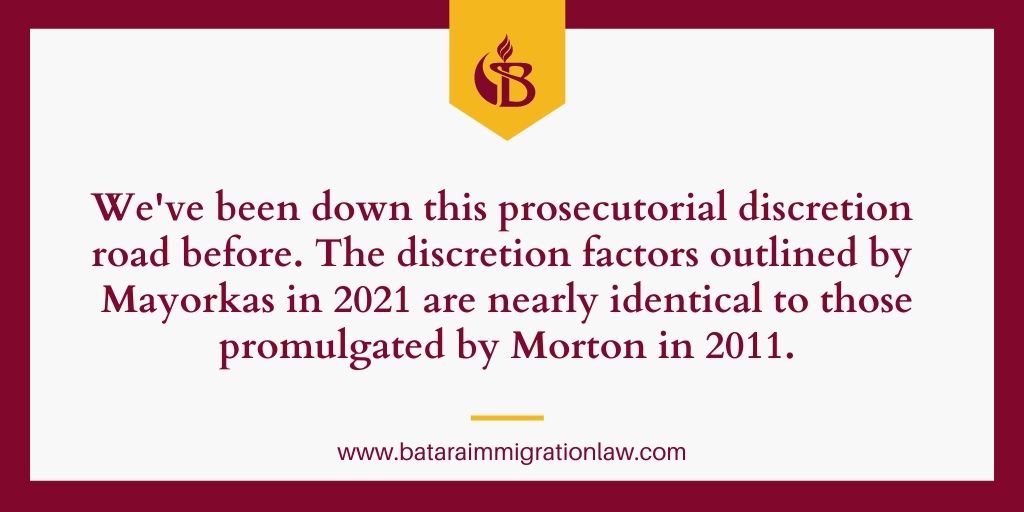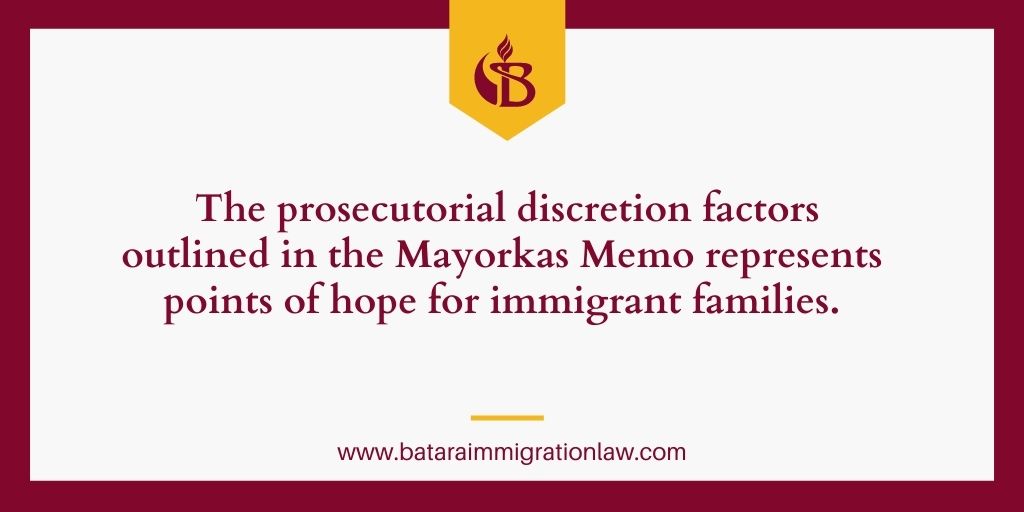
To prosecute, or not to prosecute – that is the question.
Soon after the Department of Homeland Security announced a new memorandum on prosecutorial discretion, the telephone calls started.
“Is it true,” the caller wanted to know, “the government is no longer going to try to deport immigrants without documents and I’ll be able to get a work permit?”
He heard this information from an immigration “expert” talking on the radio. He wanted to confirm the details.
As happens so, so often with immigration, potential applicants for benefits do not grasp the full details of “new” programs and policies.
This leaves them vulnerable not only to unsympathetic government officers they may encounter, but also to deceptive immigrant advocates hoping to take advantage of their naiveté.
Here’s the rub.
Prosecutorial discretion is a nice option to have in a deportation defense attorney’s toolkit. But it is only a stopgap measure. Immigrants should not be fooled into thinking the policy offers anything more than a temporary reprieve from deportation.
Prosecutorial discretion does not guarantee immigration success.
For immigrants granted prosecutorial discretion, the possibility of future green card success exists. Of course, if they qualify for any one of several permanent residence programs, they must take concrete steps to achieve their goals.
What Does Prosecutorial Discretion Mean?
In short, “prosecutorial discretion” is the discretion given to an immigration officer to decide whether or not to enforce the law against a person.
For example, if an ICE agent handling an immigrant’s case declines to pursue deportation actions against that individual, the officer has favorably exercised prosecutorial discretion.
Under immigration law, this means that immigration officers can decide not to file charges against the immigrant, not to take an immigrant into custody, or to dismiss charges which were already filed.
Deferred prosecution programs like the Deferred Action For Childhood Arrivals (DACA), too, are a form of prosecutorial discretion.
The policy is relevant once immigration court proceedings have begun. Although it does not allow the detained immigrant to permanently escape removal from the United States. Instead, it puts the case on hold.
Usually, this means the judge has reviewed the immigrant’s file and discovered, if the immigrant is not deported, he or she has a good chance to win the case. The judge, in such instances, will issue an order of administrative closure.
In one of the more common scenarios, a family member, like a spouse, is eligible to obtain a green card and immigrate through his or her U.S. citizen spouse, but needs time to get all the papers processed. The judge defers court proceedings until the green card process is completed.
If the immigrant wins lawful permanent resident status, the deportation case is dismissed.
Factors Of Prosecutorial Discretion
In the recent DHS memorandum on prosecutorial discretion, Guidelines for the Enforcement of Civil Immigration Law, Department of Homeland Security Secretary Alejandro Mayorkas explained:
“It is well established in the law that federal government officials have broad discretion to decide who should be subject to arrest, detainers, removal proceedings, and the execution of removal orders.”
He pointed out that due to limited resources, immigration law enforcement efforts should be focused on apprehending and deporting those who pose a threat to national security, public safety, and border security.
Beyond these categories, Mayorkas added, whether an immigrant should be allowed favorable discretion requires an assessment of the totality of the facts surrounding their personal history and contributions to their communities.
Accordingly, the U.S. Immigration and Customs Enforcement outlined a non-exhaustive list of factors which should guide immigration agents.

Based on my 20+ years on the front lines of immigration defense, these factors should be amplified by evidence – evidence which shows the majority of undocumented immigrants are law-abiding, productive members of our society, a point stressed by Mayorkas.
For instance:
1. The immigrant’s length of presence in the United States, with consideration given to presence while in lawful status
2. The circumstances of the immigrant’s arrival in the United States and the manner of his or her entry, particularly if the alien came to the United States as a young child
3. The immigrant’s work history and pursuit of education in the United States, with consideration given to those who have obtained specialized training, been employed in essential occupations, or are pursuing a college or advanced degree at a legitimate institution of higher education in the United States
4. Whether the immigrant or his immediate relatives have served in the U.S. military, reserves, or national guard
5. The immigrant’s family ties, including spouses, children, parents, and relatives with legal immigration status, as well as their contributions to the community, such as participation in activities like the battle against COVID, congregations of faith, and volunteering to help troubled youth, the homeless, and other at-risk individuals
6. The immigrant’s age, with special consideration given to those who are minors or senior citizens
7. Whether the immigrant is the primary caretaker of a seriously ill relative
8. Whether the immigrant or the immigrant’s spouse is currently pregnant or nursing
9. Whether the immigrant has a serious medical condition, including mental or physical disabilities
10. Whether the immigrant is a victim, witness, or plaintiff in court proceedings, with emphasis on past or present cooperation with federal, state, or local law enforcement authorities, such as ICE, the Department of Justice, the Department of Labor, and others
And perhaps most important, whether the person is likely to be granted temporary or permanent status or other relief from removal, including as the relative of a U.S. citizen or permanent resident, or any other immigration programs such as the U Visa, Violence Against Women Act, and Asylum
No single factor, of course, will determine an officer’s decision.
As noted earlier, immigrants have no right to a favorable exercise of discretion.
Some agents will be less likely than others to exercise such discretion in favor of immigrants.
This likelihood points to an important issue for immigrants and their families. Going it alone is not prudent.
If you’re planning to ask for prosecutorial discretion, retaining the assistance of an immigration lawyer, without question, is in your best interest.
How Will The Mayorkas Memo Affect
Future Immigration Cases?
The Mayorkas Memo is not the first attempt to create a more humanitarian approach to implement deferred prosecution guidelines.
Over a decade ago, I expressed doubts that a similar prosecutorial discretion effort led by former ICE Director John Morton would ever become reality.
In other words, we’ve been down this prosecutorial discretion road before.
The factors outlined by Mayorkas in 2021 are nearly identical to those promulgated by Morton in 2011.

My outlook, as expressed way back regarding Morton’s announcement on June 17, 2011, in More Empty Talk Or The Real Deal This Time?, remains relatively unchanged.
Past experiences demand cautious optimism.
These experiences include the unwillingness of DHS agencies to genuinely implement the Morton recommendations.
To be clear, I believe Mayorkas’s guidelines are a positive development in a system far too slanted to deportation and removal, regardless of an immigrant’s equities.
Yet, as a deportation defense lawyer, I’ve seen too many instances where a little ounce of kindness and dignity by immigration authorities would have prevented families from being needlessly separated.
My concern, in short, remains that immigrant-friendly discretion will not become reality due to a lack of true commitment by ICE officers.
Without their support, like Morton’s earlier guidelines, the Mayorkas plan has little chance of succeeding.
But there’s more than law enforcement procedures at issue here.
Political considerations lurk in the background.
The Mayorkas Memo: A Road Map For Prosecutorial Discretion Success
Unsurprisingly, in his announcement, Mayorkas’ ten factors impliedly addressed the intent to help certain categories of immigrants with positive equities.
- Immigrants, brought here as minors, who qualify for the DREAM Act
- Immigrants with U.S. citizen or permanent resident spouses
- Immigrant veterans who honorably served the U.S. armed forces
- Immigrant victims of trafficking and domestic violence
The vast majority are stuck with no path to legalization due to a stalemated and callous Congress.
Doomed, at least temporarily, to political lethargy, officers are being asked to look at each case more carefully and compassionately, with an eye on immigrants’ futures.
The prosecutorial discretion factors outlined in the Mayorkas Memo represents points of hope for immigrant families.

Government interviewers should ask not only, “Is this person here without legal papers?” They should also inquire about what, if any, remedies does this immigrant have now, or in the not-to distant future, for becoming a permanent resident.
This is a 180 degree shift in their routines.
Understood properly, this is a win-win situation.
If ICE officers are open to following the Mayorkas Memo, many community-contributing, law-abiding immigrants will be spared from deportation.
By avoiding prolonged immigration battles, the prudent exercise of deferred prosecution will decrease governmental detention and prosecution costs – as well as lower expenses of immigration courts and appellate courts, reducing unnecessary trials, appeals, motions to reopen, and motions to reconsider.
However, based on my experience as a San Diego immigration lawyer, changing the culture of immigration agencies long accustomed to viewing the world through an “us versus them” lens, is a tall order. At best, it won’t happen overnight.
This also means the role of immigration attorneys has taken on a new dimension. They will need to fight for clients earlier in the immigration process, the sooner the better after an individual is detained and taken into ICE custody.
Since many immigration officers will be reluctant to accept the policy shift, lawyers will need to exert their influence in a firm yet diplomatic manner. immigrant advocates cannot simply cave into the stubborn mentality of some ICE agents.
Likewise, opportunity for prosecutorial discretion changes how immigration clients need to view their cases. Far too often, many families of immigrants have been unwilling to pay for the help of immigration lawyers at an early stage of court proceedings.
Whether a lasting change will take place is anyone’s guess. I’m not terribly confident. But with immigrant lives on the line, I will certainly stretch the hope imparted by the Mayorkas guidelines as far as it can be stretched.
I encourage all pro-immigrant attorneys to do the same.
To loosely paraphrase the Bard, “To prosecute, or not to prosecute – that is the question. Whether ’tis nobler in the mind to suffer the slings and arrows of outrageous fortune, or take arms against a sea of troubles?”
Winning prosecutorial discretion requests won’t be easy.
But it’s a better option than to simply roll over and allow the government to separate one’s family, often permanently.
And quite frankly, with a little hard work, success is achievable.
By Carlos Batara, Immigration Law, Policy, And Politics




